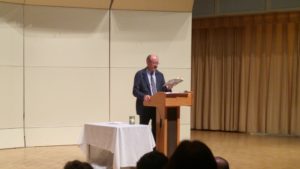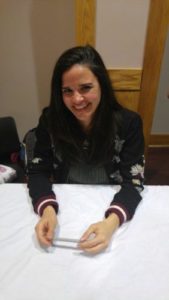
Billy Collins closed out the 2016 Literary Festival on April 6. Photo by Brandon Key.
On April 6, the Coulter recital hall filled up with people to listen to a poetry reading from one of the most famous contemporary poets: Billy Collins. After 13 artists visited WCU, the 15th Literary Festival ended.
This year’s Literary Festival started on April 3 and featured short story writers, novelists, poets and for the first time, a photographer.
Monday’s presenters were poet Pat Riviere-Seel, nonfiction writer Stephen Clingman and nonfiction writer Elena Passarello.
Seel appeared as part of the Gilbert-Chappell Distinguished Poets Series with some of her students. Seel was asked why she writes poetry and she described it as an essential part of being human.
“It will save your life. Poetry is a connection we can’t have through prose,” said Seel. “It connects you to your sorrows, dreams, wants and desires.”
Clingman was born and raised in South Africa and is a former teacher of WCU English professor Laura Wright. Clingman read work that focused on identity, and then spoke about his life in South Africa as a white man.
“Growing up in South Africa white, African and Jewish was challenging. I went to a double-segregated school and was drafted in the army,” explained Clingman. His experiences in Africa would heavily influence his work as a nonfiction writer interested in identity.

Elena Passarello is a creative writing professor at Oregon State University. She read from her essay collection, “Animals Strike Curious Poses.” Photo by Brandon Key.
Passarello presented in the evening and read from her essay collection “Animals Strike Curious Poses,” which focuses on specific types of animals across almost four millennia.
Tuesday saw a day focused on unconventional poetry and fiction stories. WCU’s Paul Worley and students from his Beats Generation class read poetry that talked about Russia, plastic lovers and random combinations of topics, like “The Canterbury Tales” with Wonderland from “Alice in Wonderland.” Worley’s class also put together their own book of poems called “Alternative Facts” that was for sale during the festival with help from City Lights Bookstore.
Fiction writers Robert Gipe and Carrie Mullins presented in the afternoon. Following them was photographer Roger May, whose current photography project revolves around the affects coal has on the environment and families in West Virginia and Kentucky. Short story writer and novelist Michael Knight presented in the evening.
Day three of the festival saw fiction writer Jamie Quatro and nonfiction writer Stephanie Elizondo Griest. Quatro read a story about the human decomposition. Griest’s writing often deals with women in other countries and has written a memoir about her life living in different places in the world.
The final day of the festival was dedicated to poetry. Poets Sue Weaver-Dunlap and Ray McManus started the day and Billy Collins wrapped up the festival. The Collins reading was held in the Coulter recital hall with a full auditorium. Collins read from his older works and his newer works.
When asked why he writes poetry, Collins said, “poetry is the history of the human heart and a lot of poems come from other poems. I dig for more history of humanity and I find more poems.”
Many of the writers at the festival gave their advice on writing and what they’ve learned from writing. Below is a link to photo slideshow from some of the presenters and what they had to say.
While Collins wrapped up this year’s Literary Festival, next year’s festival is already in the works. Pamela Duncan, associate professor of English and Literary Festival director, has already started working on future Literary Festival.
“Next year, we’re partnering with the Bardo Arts Center to bring Tony Kushner to campus,” said Duncan. Kushner is an Academy Award-nominated screenwriter and a Tony Award-winning playwright. He was nominated for Best Adapted Screenplay in 2013 for the film “Lincoln.” He also received a National Medal of Arts from President Barack Obama in 2013.
Duncan is also interested in possibly bringing a comic book or graphic novel writer to the festival in the future.


